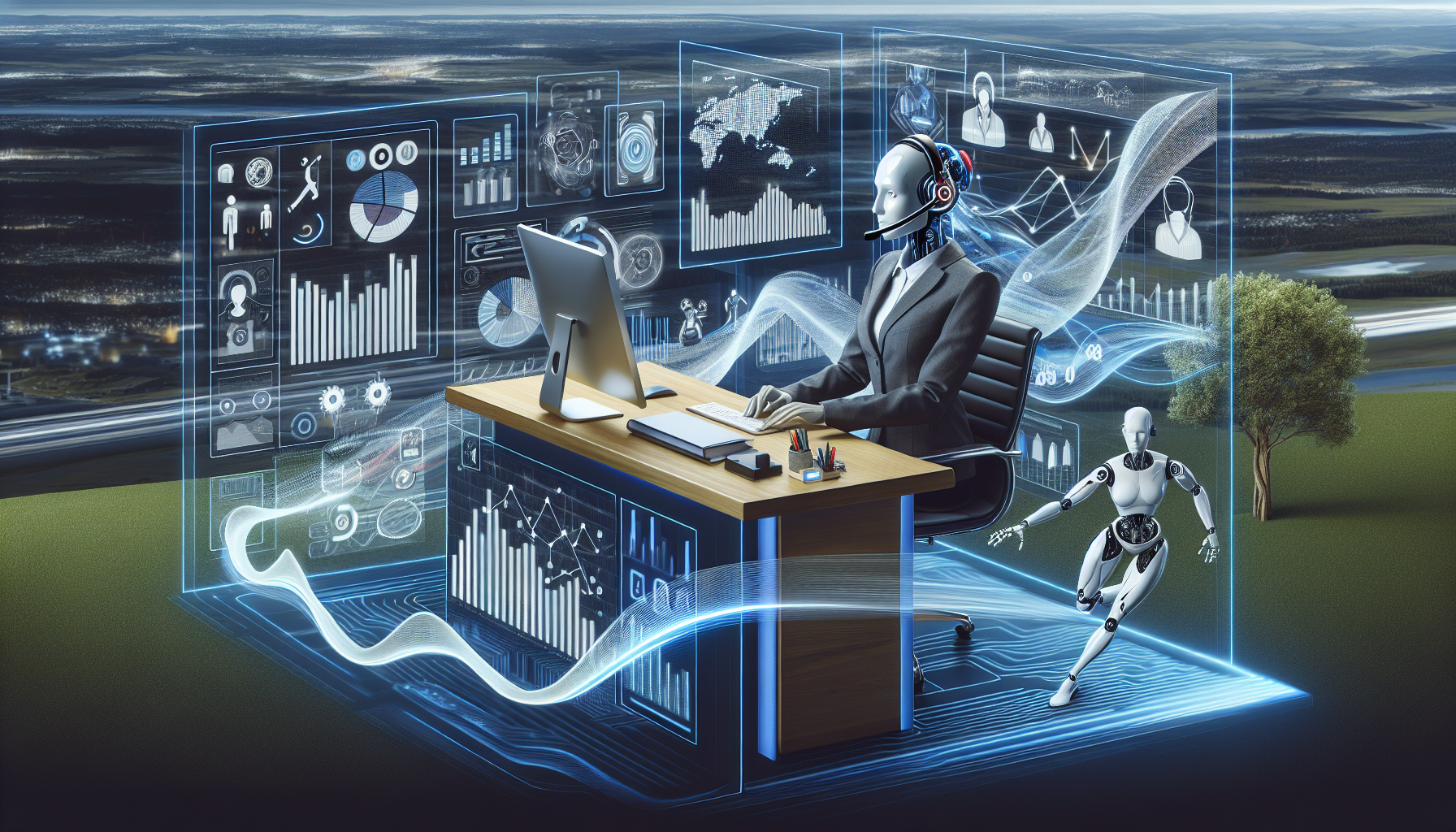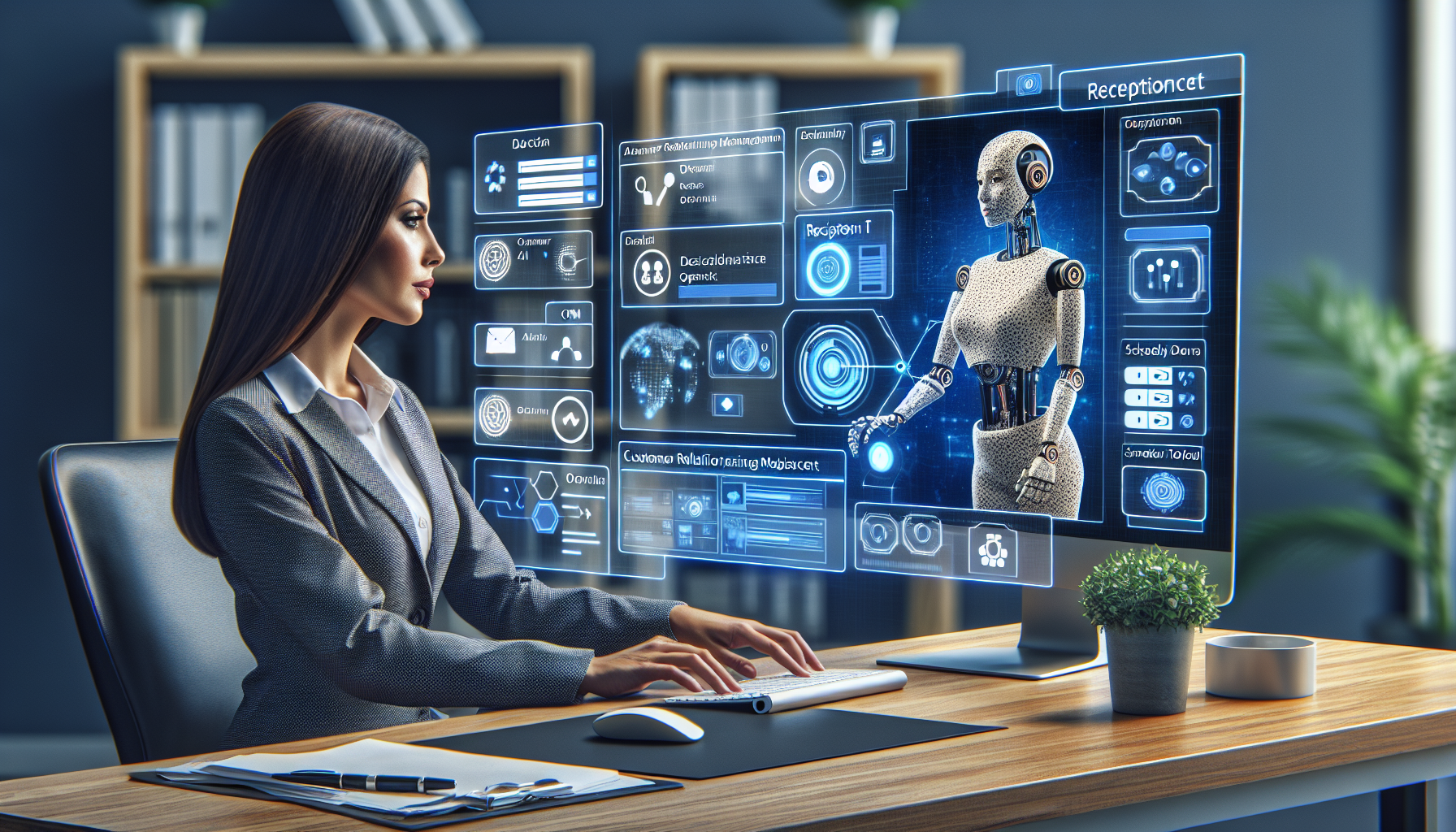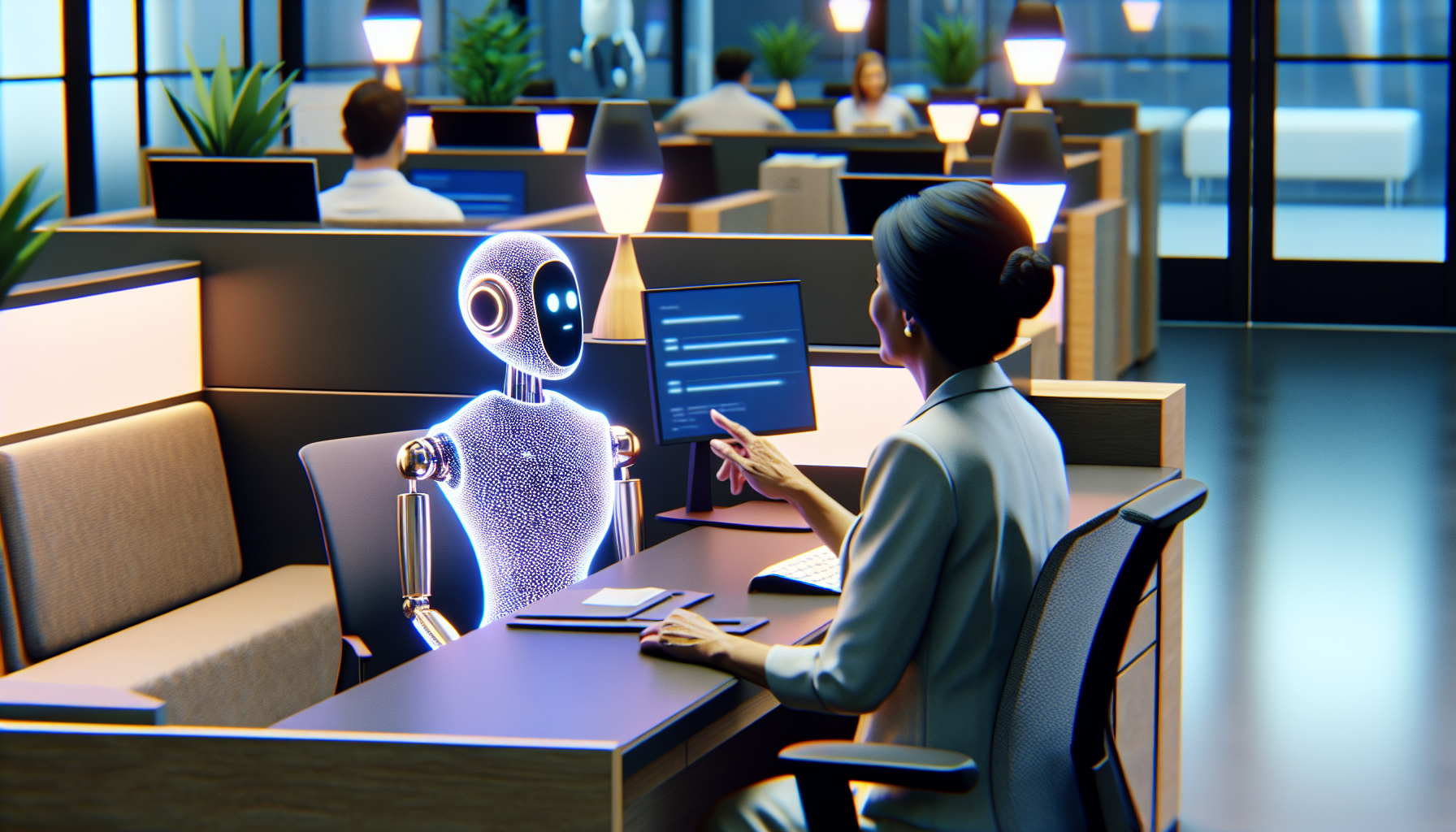
In an era where time is of the essence and customer satisfaction is paramount, businesses are increasingly turning to AI-powered solutions such as AI Receptionists to streamline their operations. The inclusion of AI Receptionists in the workplace is a testament to the significant role that artificial intelligence has come to play in modern business environments.

An AI Receptionist, also known as a virtual receptionist, is an application powered by artificial intelligence that has been programmatically trained to perform the tasks typically associated with a human receptionist. These tasks may range from answering and routing calls, managing appointments, to responding to customer queries.
One of the most notable advantages of AI Receptionists is their 24/7 availability. Unlike their human counterparts, they are not restricted by office hours or breaks, offering around-the-clock services to the delight of customers in different time zones. The ability to integrate with other applications is another competitive edge that AI Receptionists have over humans. They can seamlessly merge with other apps and scheduling tools to provide an integrated customer service experience.
Furthermore, an AI Receptionist can manage multiple communications simultaneously, ensuring your customers never have to wait on hold. The fact that these virtual receptionists can handle these tasks without human intervention not only increases business agility but also greatly enhances adaptability.
Indeed, these advanced features of AI Receptionists - 24/7 availability, integration with other apps, and the capacity to handle multiple calls simultaneously - offer businesses a strategic advantage by facilitating swift response to market dynamics and customer needs.
Artificial intelligence (AI) has significantly transformed the business world, ranging from predictive analytics to automated customer service. AI receptionists act as the frontline of customer service, facilitating exceptional customer experience opportunity through 24/7 availability, real-time assistance, and personalizing customer interactions. AI receptionists lead to increased business agility, enabling businesses to adapt quickly to fluctuating customer demands and market scenarios.
One of the key benefits of using AI receptionists is their ability to ensure no call gets missed. Irrespective of the volume of incoming enquiries, an AI-powered receptionist can efficiently and effectively manage all customer calls. This not only enhances the business's responsiveness but also leaves a positive impact on the customer. A study by IBM reveals that among the top reasons customers opt for AI service, 24/7 availability tops the list.
AI receptionists also provide real-time assistance. Through AI's natural language processing abilities, these digital receptionists have the capability to understand and respond to customer queries promptly. This has lessened waiting times, reduced customer frustration, and improved overall customer experience. A survey by Salesforce states that 64% of consumers expect to receive real-time assistance, regardless of the channel.
Perhaps the most significant impact of AI receptionists comes in the form of personalizing customer interactions. These digital assistants can tap into a business's customer database, analyze past interactions, purchasing behavior, preferences, and tailor conversations accordingly. This adds a personal touch to customer interactions, making them feel valued and appreciated. A study by Accenture shows that 91% of consumers are more likely to shop with brands who recognize, remember, and provide them with relevant offers and recommendations. Therefore, the introduction of AI receptionists is a strategic move towards increasing customer retention and loyalty.
In a nutshell, AI receptionists improve business operations by ensuring efficient call handling, providing real-time customer service, and personalizing customer interactions. By doing so, they enable businesses to stay agile and adaptable in a fast-paced, ever-evolving marketplace.
The transition from traditional receptionist roles to the use of AI Receptionists has become increasingly prominent in modern businesses. This technology brings about considerable improvements, especially in terms of business agility and adaptability.
AI Receptionists are not just about answering phone calls or dealing with enquiries. They bear much more potential, specifically in terms of integration and automation. They can seamlessly blend with various business tools and applications like Zapier, CRM systems, and scheduling utilities. This blend enables an optimum level of smart automation in many relevant areas.

In the dynamic business environment, swift communication and transparency of information are fundamental. When AI Receptionists are linked to the company’s CRM system, the communication process becomes faster and more efficient. Client inquiries and messages are promptly handled and documented in the CRM, enabling a swift follow-up and decision-making process. An excellent example of this integration could be seen through platforms like HubSpot and Salesforce.
The Integration of AI Receptionists also greatly supports scheduling activities. Workload can be significantly reduced as appointments, reminders, and meetings get conveniently organized and managed. Tools like Calendly and Doodle make this possible.
In essence, the synergy of AI Receptionists with other business applications contributes to increased operational efficiency and flexibility. Using AI in this multi-tasking capacity can help companies adapt more quickly to changes and effectively manage resources - an attribute that is positively linked to business agility.
In the fast-paced, techno-savvy world of business, dexterity and agile adaptability are paramount. Achieving never-before-seen levels of operational efficiency can come down to implementing transformative technology such as AI Receptionists. Contrasting to human receptionists whose capacity for simultaneous calls is limited, AI-powered receptionists handle unlimited concurrent queries. This groundbreaking technology is gradually redefining how we perceive business agility and adaptability.
AI Receptionists adopt sophisticated Natural Language Processing (NLP) technology to comprehend and process intricate queries at unmatched speeds. By utilizing machine learning algorithms, they offer businesses a powerful tool to scale their operations without a proportional increase in resources or staff. Simultaneously, these AI Receptionists learn and grow more proficient over time, enhancing their ability to provide accurate responses and improving customer service quality.
The capability to aid an unlimited number of callers concurrently, coupled with the efficiency of automatically categorizing and prioritizing responses based on the customers' needs, has made AI receptionists an integral part of scalability strategies for businesses worldwide. As AI receptionists have zero downtime and provide round-the-clock assistance, businesses can ensure any customer's inquiry never goes unanswered, irrespective of the time and region. This feature significantly increases the potential outreach and customer retention of any enterprise.
As businesses adapt and grow in the digital epoch, the impact of AI receptionists on business agility and adaptability is becoming increasingly apparent. The integration of these systems allows businesses to accommodate enhanced customer traffic and complexities comfortably, fostering a smoother, more efficient service and cultivating a superior customer experience.
However, these systems are not without their challenges. The journey of implementing AI receptionists requires a thorough understanding of the organization's unique needs, the careful selection of technology partners, and continuous monitoring and optimization whenever necessary. Business adaptability is not about a one-time transition to automation but about the ongoing pursuit of excellence, scalability, and customer satisfaction.
The emergence of AI receptionists has significantly transformed business operations across various industries. Businesses are now leveraging this technology to increase their agility, enhance customer service, and remain competitive in the ever-evolving business environment. This section delves into real-world examples to analyze this impact.

Firstly, let's look at the healthcare sector. Insider reports that many hospitals and clinics have embraced AI receptionists to handle patient inquiries, manage appointments, and provide general hospital information. This has fostered an impressive level of efficiency, enabling medical professionals to devote more time to patient care. Consequently, such institutions have managed to adapt to the surge in patient numbers without compromising on the quality of their services.
In the financial sector, AI receptionists are also making significant strides. Forbes highlights how banks have used AI-powered chatbots to function as virtual receptionists, effectively handling client queries. With such assistants, these institutions can rapidly adapt to changes, including increased transaction volumes or customer inquiries, hence, displaying remarkable agility.
In the hotel and tourism industry, the integration of AI receptionists has also been transformative. Hotels like Henn na Hotel in Tokyo have incorporated AI receptionists, which has bolstered their operational flexibility and adaptability. These robots handle check-ins, answer guest questions, and process payments, pushing the boundaries of what's possible with AI in hospitality.
The above examples serve as ample evidence of the profound impact of AI receptionists on enhancing business agility and adaptability. By automating receptionist tasks, businesses can react rapidly to changes, meet customer expectations, and remain competitive in today's high-speed, tech-driven world.
The world of business communication is currently undergoing a revolution, courtesy of Artificial Intelligence (AI). AI is transforming every aspect of business operations, but it is perhaps most felt in the realm of customer service, where AI receptionists are starting to become a common feature. With their capable hands—or rather, algorithms—AI receptionists are primed to offer adaptable, agile, and efficient communication solutions that cater to modern business needs.
AI receptionists are essentially AI-powered virtual assistants assigned to handle front desk duties. They answer calls, manage appointments, and interact with clients, among other tasks. The value of these AI systems goes far beyond their ability to perform routine tasks efficiently—they are revolutionizing the way businesses communicate.
So, what does the future look like for AI in business communication? The current trajectory of advancements suggests a future where AI receptionists become the nexus of business communication. This shouldn't come as a surprise, considering the range of benefits they offer. For one, AI receptionists can handle vast volumes of inquiries without succumbing to fatigue. They can work round the clock and across different time zones. As the technology becomes more sophisticated, these receptionists will be able to handle even more complex tasks, such as addressing customer complaints and concerns.
Moreover, with the emergence of Machine Learning (ML) into mainstream business applications, these AI receptionists will be capable of learning from past interactions, improving their services over time. This flexibility and adaptability will further increase businesses' agility, allowing them to adapt their communication strategies in real-time to meet evolving customer needs.
In a fast-paced business environment, this kind of adaptive, always-learning, and all-seeing AI receptionist could provide the decisive edge businesses need to stay ahead. When coupled with other AI-driven technologies, it will not only streamline communication but also transform businesses into agile, adaptable entities ready to respond to ever-changing market dynamics.
While there may be challenges ahead, it is clear that the future of AI in business communication lies within these robust, flexible, and efficient AI receptionists. Businesses that leverage this technology early enough will likely enjoy a competitive advantage in our increasingly digital-oriented world.
Start your free trial for My AI Front Desk today, it takes minutes to setup!








